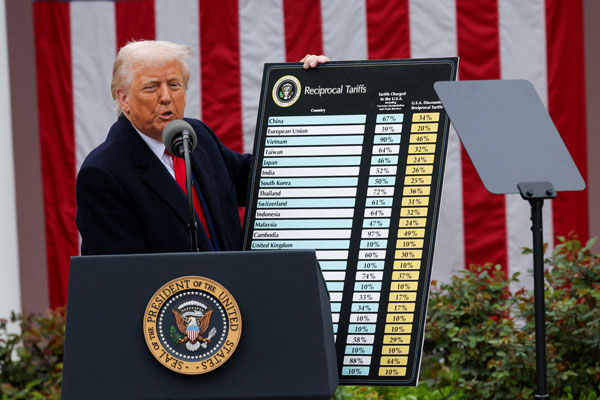Australia rejects China's proposal to counter US tariffs

U.S President Donald Trump delivers remarks on tariffs in the Rose Garden at the White House in Washington, D.C, U.S., April 2, 2025. PHOTO/ REUTERS
What you need to know:
- U.S. President Donald Trump, in a stunning reversal, on Wednesday said he would temporarily lower hefty duties on dozens of countries but continue to target China
Australia on Thursday declined Beijing's proposal to work together to counter US tariffs, saying instead it would continue to diversify its trade and lower its reliance on China, its largest trading partner.
"We are not going to be holding hands with China in respect of any contest that is going on in the world," Deputy Prime Minister Richard Marles told Sky News, referring to the Chinese ambassador's proposal for countries to "join hands" on trade.
"We are not doing that. What we are doing is pursuing Australia's national interests and diversifying our trade around the world."
He said Australia would build its economic resilience by strengthening trade ties with the European Union, Indonesia, India, Britain and the Middle East.
In an opinion column in The Age newspaper, China's ambassador to Australia Xiao Qian urged Canberra to collaborate with Beijing to defend the multilateral global trading system.
"Under the new circumstances, China stands ready to join hands with Australia and the international community to jointly respond to the changes of the world," Xiao said.
U.S. President Donald Trump, in a stunning reversal, on Wednesday said he would temporarily lower hefty duties on dozens of countries but continue to target China, raising the tariff to 125 percent from 104 percent, further escalating a trade war between the world's two largest economies.
That could pose a risk to Australia, which ships almost a third of its goods to China. Exports to the United States are less than 5 percent of Australia's total goods exports.
Australia's central bank has warned the ongoing uncertainty over tariffs and other trade restrictions between the U.S. and other major economies could have a chilling effect on business investment and household spending decisions in the country.
Trump has imposed a unilateral 10 percent tariff on Australia, the low end of his reciprocal tariffs for all imports into the United States.
Prime Minister Anthony Albanese has said that while the duty on Australia, a key US security ally in the Indo-Pacific, has "no basis in logic", his government would not retaliate.




